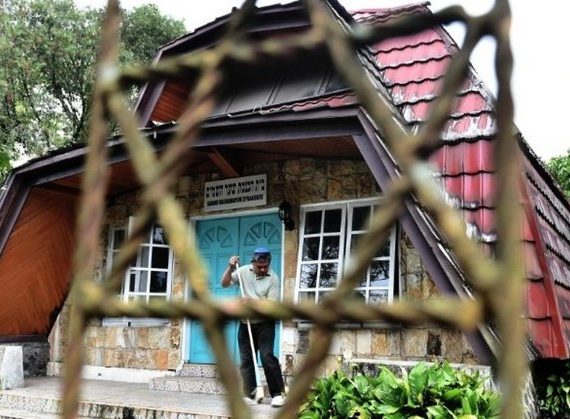Arab News
By: Rabbi Marc Schneier
February 23, 2022

A member of Indonesia’s Jewish community sweeps the synagogue steps, ahead of a prayer service, in Tondano, North Sulawesi, Feb. 17, 2017. (AFP)
Indonesia is more than just the beaches of Bali, skyscrapers of Jakarta or coffee and clove fields of Java. It is also the fourth most-populous nation in the world, the home to more Muslims than any other country and a historic beacon of religious tolerance.
For proof, Indonesia passed another test of its commitment to Muslim-Jewish relations in the last couple of weeks. When the opening of the country’s first Holocaust museum sparked a backlash led by Islamists, Indonesian leaders stuck to their tolerance bona fides and defended the principles of pluralism. The president and representatives of Indonesia’s largest Islamic organization stood by the museum.
Few people connect the story of Jews with Indonesia, but they have been a part of the archipelagic nation’s history for more than 400 years. Jews arrived with the Dutch East India Company in the 17th century and, even today, prejudice against them is amplified as they are seen as descendants of the former colonizer, as well as practitioners of a minority religion. While Jews account for only a miniscule fraction of Indonesia’s 280 million people, their story of struggle must be remembered.
During the Japanese occupation of Indonesia, Ashkenazi Jews were interred alongside Europeans in camps with horrific conditions. And, in 2013, following protests by fringe groups, the Beith Shalom synagogue in Surabaya on Java was destroyed. The latest furor has centered on the Jan. 27 opening of the Shaar HaShamayim Holocaust Museum in the city of Tondano, Sulawesi. It is located at Indonesia’s only synagogue, the Shaar HaShamayim Synagogue led by Rabbi Yaakov Baruch, and was created to honor the victims of the Holocaust and educate Indonesians on the dangers of anti-Semitism.
“President Joko Widodo has been a stalwart champion of moderate Islam and interfaith tolerance.”
Rabbi Marc Schneier
Fundamentalists protested the museum, demanding its closure for reasons that are but thin veils for anti-Semitism. Hidayat Nur Wahid, a senior figure in the Islamist Prosperous Justice Party, suggested the museum was an Israeli ploy to secure diplomatic relations with Indonesia. Conflating the simple remembrance of arguably history’s most evil atrocity with the complexities of modern-day Arab-Israeli politics is not helpful, but it is not surprising. Even more absurd was the call of Muhyidin Junaidi, vice president of the Indonesian Council of Ulama, who said the museum “should be razed to the ground.” He said the museum violated the country’s constitution and Pancasila, the set of founding values that guide Indonesia.
And yet, Indonesia’s largest Islamic organization, Nahdlatul Ulama, has supported the museum and the national government has never wavered. President Joko Widodo has been a stalwart champion of moderate Islam and interfaith tolerance, guiding the national government in a wholescale embrace of all of Indonesia’s minorities. “Pluralism has always been a part of Indonesia’s DNA,” he has declared.
I had the privilege of visiting Indonesia in 2014 at the invitation of the president. I traveled with Imam Shamsi Ali to speak about our book, “Sons of Abraham: A Candid Conversation About the Issues that Divide and Unite Jews and Muslims.” This first ever joint speaking tour in Indonesia by an imam and a rabbi left a profound impression on me and gave me an intimate look at the tolerance embedded in the national culture. And as a demonstration of Widodo’s commitment to strengthening Muslim-Jewish relations, his government instructed the translation of our book into the Indonesian language.
The museum episode demonstrates that sometimes the loudest barkers get the headlines. But the totality of Indonesia’s response reminds us that this is a peaceful and hospitable nation that embraces its ethnic and religious minorities.
Holocaust museums around the world have a simple, singular purpose: Ensuring the horrors of history are never repeated. They are not stealth statecraft for complicated political problems, they are about remembrance.
“Never, ever forget history,” said Sukarno, Indonesia’s founding father and first president. I think he would have supported the museum in Sulawesi. And I have faith it will remain open and serve as a beacon of interfaith tolerance in the true spirit of Indonesia.
Rabbi Marc Schneier is president of the Foundation for Ethnic Understanding and a noted adviser to many Gulf states.




